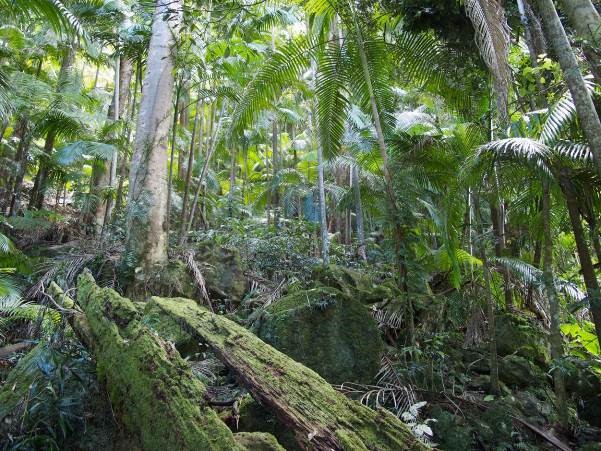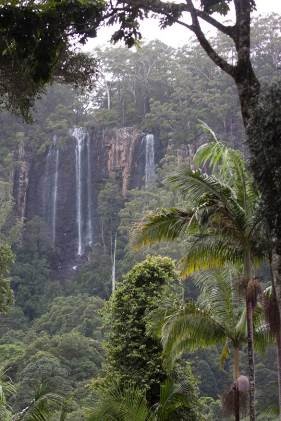Restoring & Connecting Rainforest Habitat in Wanganui Gorge Stage 2
Transforming dense areas of weeds to lowland rainforest through assisted natural regeneration
Nightcap National Park in Byron Shire hinterland

Overview:
Wanganui Gorge supports critically endangered lowland rainforest and provides habitat for 28 threatened species.
Threatened fauna recorded on site include the Pouched Frog, Stephen’s Banded Snake, Bush-hen, Albert’s Lyrebird, Wompoo Fruit-Dove, Red-crowned Fruit-Dove, Superb Fruit-Dove, Sooty Owl, Marbled Frogmouth, White-eared Monarch, Red-legged Pademelon, Eastern Tube-nosed Bat, Golden-tipped Bat, Grey-headed Flying-fox, Large-footed Myotis, Little Bent-wing Bat, Eastern Long-eared Bat and Eastern Freshwater Cod.
Threatened flora species include Southern Ochrosia, Arrow-head Vine, Thorny Pea, Ravine Orchid, Red Bopple Nut, Red Lilly Pilly, Rusty Rose Walnut, White Laceflower, Waxy Sarcochilus and Flax Lily.
Weeds, including lantana and climbing asparagus had degraded habitat, restricting natural regeneration and blocking movement of fauna. Systematic control of weeds is facilitating natural regeneration and improving condition and connectivity of lowland rainforest and habitat for threatened species.
Envite Environment has been undertaking ecological restoration works in Wanganui Gorge for over 14 years and has been instrumental in transforming dense areas of lantana and other weeds to lowland rainforest through assisted natural regeneration. Lantana had infested areas for over 40 years effectively blocking rainforest from regenerating in this resilient area and identified wildlife and climate change corridor.
Methods used for bush regeneration are recognised best practice as accepted by organisations including the Australian Association of Bush Regenerators (AABR), National Trust and Greening Australia. A Restoration Action Plan has been developed and guides ecological restoration works.
Outcomes:
Restoration works on the adjoining 40 ha in the south of the Gorge have shown that once weeds are controlled there is rapid rainforest regeneration on this highly resilient site. This is the fourth project funded by NSW Environmental Trust in Wanganui Gorge with the focus on the northern 22ha area which had not had previous ecological restoration works.
The southern project area received the Society for Ecological Restoration Australasia (SERA) 2018 Award in Restoration Excellence for Wompoo Gorge Restoration Project.
The long-term benefits resulting from the project include improved habitat for threatened species which will contribute to securing populations at the site into the future. Large areas of lantana will be replaced by rainforest. Connectivity and condition of lowland rainforest will be improved in this identified habitat and climate change corridor.
This project has been assisted by the NSW Government through its Environmental Trust.
Click on the image to enlarge







